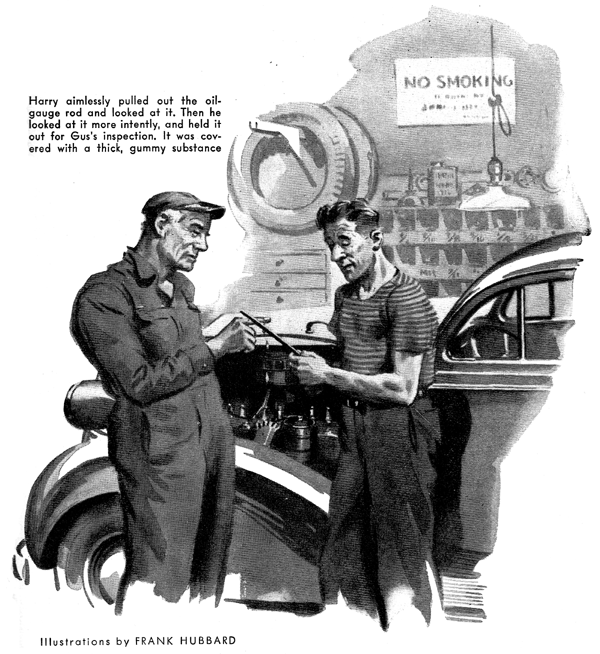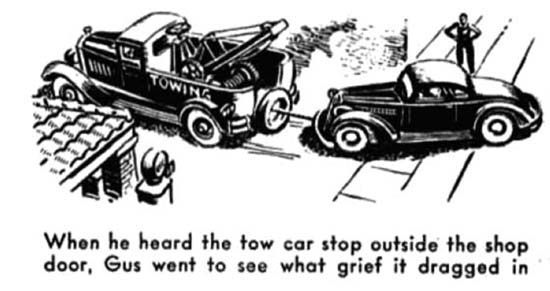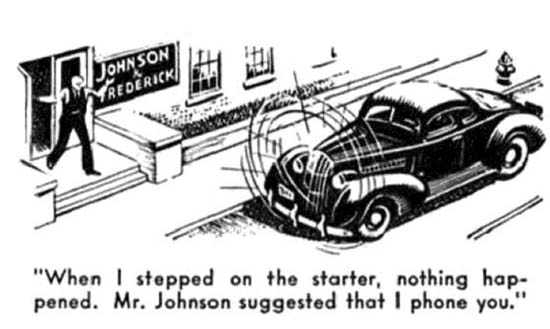November 1938
QUEER TROUBLES
WITH OIL
by
Martin Bunn

Gus Wilson, busy in the shop of the Model Garage, heard the telephone in the office ring, and Joe Clark, his partner, answer the call. Then Joe called to him.
"Hey, Gus! job for the tow car. Fellow in a black coupe, in front of Johnson and Frederick's factory. Says he's run his battery down trying to get started, but can't get his engine to turn over. Have to pull him in."
"All right!" Gus shouted back at him. Then he turned to Harry, the promising young mechanic.
"You go get him."
Twenty minutes later he heard the tow car stop outside the shop door, and went out to see what particular variety of grief it had dragged in.
Seated in the towed coupe was a business-like looking young man with a puzzled expression on his face. Gus's quick glance took in a pile of advertising literature on the ledge in back of the seat, which confirmed his impression that the new customer was a salesman.
"Hello," he said cheerily. "What's wrong?"
"You tell me!" the young man replied, getting out of his car. "My bus ran all right this morning. But when I came out of Johnson and Frederick's where I'd been for a couple of hours figuring a job, and stepped on the starter -- nothing happened. I kept on stepping on it but couldn't get the engine to turn over. You know how it is -- you keep thinking that the next kick will do the trick, and then the first thing you know your battery's down. Mr. Johnson came out just then, and suggested that I phone you."
"He's a customer of ours," Gus said. "No trouble with your car lately, eh?"
"Two or three mornings ago," admitted the young man, "it gave me a battle before I got it started. Couldn't get the engine to turn over -- pretty much like today. But after a dozen or so tries she began to buzz, and I didn't have any more trouble until this afternoon. I know a little something about electricity -- sell electrical fixtures -- so I checked up on the wiring. It seemed O.K."
When the car had been rolled into the shop, Gus raised the hood, sniffed a few times, and then uncapped the radiator filling pipe and squinted down it. "Water seems a little low," he remarked. "Better fill her up, Harry." He turned to the customer. "Been using any more water than usual. Mr. -- Mr.?"
"Joe Kent is my name," the young man said. "Yes, now that you mention it, I think that for the past week or so I have been using a little more than I usually do."
Gus hummed tunelessly under his breath as he watched Harry hose a quart or so of water into the filling pipe.
"Ever notice any white vapor coming out of the exhaust?" was his next questions.
"Haven't noticed it," said Kent.
"Or water on your garage floor?" asked Gus.
'Well, I've noticed a little water on the floor now and then," Kent replied, "but I never bothered to see where it came from."
Gus pulled out the bayonet-type oil gauge and peered at it. Then he looked at Kent and grinned. "Your trouble isn't very serious," he said. "Just a blown cylinder-head gasket."
"Cylinder-head gasket?" echoed Kent.
"Why, what has that to do with my not being able to get started?"
"I'll show you," Gus assured him. He began to take out spark plugs, looking closely at each before he laid it aside. After he had examined the fourth, he held it out and Kent saw that several drops of water glistened on it. "This cylinder is the baby that's making all the trouble," Gus told him. "Come on, Harry -- help me get the head off it."
When they had removed the head, Gus peered into the cylinder. "Full of water that's leaked in from the water jacket through a broken gasket," he said. "Take a look, Mr. Kent -- you too, Harry. This is something that doesn't happen so very often. See why you couldn't get your engine to turn over, Mr. Kent? When you went into Johnson and Frederick's, it happened that your engine stopped just as the piston of this cylinder was starting its compression stroke. While you were in there, the cylinder had time to fill up with water. When you stepped on your starter, the resistance of the water in the cylinder kept the piston from moving, so naturally the engine couldn't start."
"Well, that's a new one on me, and I've driven quite a few thousand miles," Kent admitted. "Never even heard of it happening before. You've lived up to your reputation as a trouble-shooter, Mr. Wilson -- but, say -- how long is this job going to take? Can you get me rolling in an hour?"
"We sure can," Gus said. "We'll have to put in a new gasket, drain your oil --- there's a heck of a lot of water in it now -- flush out the engine, and fill her up with fresh oil. But we won't be more than an hour doing it. Just step into the office, and my partner will make you comfortable while you're waiting. You might even use your time trying to sell him a couple of desk lamps -- goodness knows we need them!"
"What I don't understand about this job," Harry said as he started to fit a new asbestos-lined copper gasket, "is how he could get his car started the other morning, when he couldn't get it started today."
"That's easy," Gus told him. "Probably this old gasket has been leaking for a couple of weeks or so. This Kent isn't a very noticing sort of fellow, or the performance of his engine would have put him wise to the fact that there was a compression leak in one of the cylinders. But the water that leaked into this cylinder from the water jacket didn't affect the starting of his car except when he had stopped the engine just as the piston of this particular cylinder was starting its compression stroke, and then let the car stand long enough for the cylinder to get pretty well filled up with water.
"That's what happened when he had his first trouble a few mornings ago. But that time two things made it possible for him to get started after a while.
"One of those things was that the cylinder hadn't completely filled with water -- probably because the piston had partly completed its compression stroke when he had cut off his engine. The other was that he had a good, lively battery. Every time he stepped on the starter the piston would advance a little against the water cushion, and force a little of the water out of the cylinder. It happened that before he had run his battery all the way down, he had forced out all of the water, so his engine started. Savvy?"
Harry nodded. Gus watched him closely as he cleaned the faces of both the cylinder head and the cylinder block thoroughly, fitted the gasket carefully, and replaced the head. Harry hesitated for a moment, then went into the office and returned with a diagram which he consulted before he replaced and began to tighten the cylinder-head stud nuts.
Gus nodded approval. "I'm glad you remembered that," he said. "It's always a good idea to tighten those stud nuts in the order that the manufacturer recommends. If the manufacturer doesn't recommend any particular order, start with the nuts at the center of the head and work outward tightening the corners last. Draw the nuts down snugly, but not tightly. Then go over them, in the same order a second and a third time. Be sure to get all the nuts to the same degree of tightness. If they are uneven the result may be expensive -- a cracked head or even a distorted cylinder block. After the engine has been run long enough to get it thoroughly warmed up, tighten them again. And tell the customer to bring his car back after he has run it for a few hundred miles, so that you can give them a final tightening."
"Right!" Harry said, as he went on with his job. "Here's another thing, Gus -- is there any way for water to get into a cylinder except through a leaking gasket?"
"Yes, there sure is," Gus told him. "As a matter of fact, first off I thought this was something else. Then I put two and two together and decided it couldn't be."
"Couldn't be what? " asked Harry.
"Couldn't be a cracked cylinder. You see, when a cylinder cracks, it's usually at a point where it's been weak for some time, and when it goes, it goes. That lets in more water than just a tiny gasket leak, and multiplies the troubles that Kent's been having, many times."
"Suppose that spark plug hadn't been wet, and you couldn't see signs of moisture in any cylinder. How would you make sure that there was a leak?" asked the mechanic.
"That's not so hard," replied Gus. "First, fill the radiator right up to the top. Then run the motor until it is thoroughly warmed up. Shut the motor off and crank it slowly by hand. As the piston comes up on the compression stroke in the cylinder that's got a leak in it, it'll force air through the place where the leak is into the water jacket. If you squint down the radiator filter opening you'll see air bubbles if you watch closely."
"Gosh, Boss!" Harry exploded. "You sure do know all the answers!"
"Wish I did," sighed Gus, modestly.
Kent's car was ready on time, and he hurried on his way. Gus made out a time-and-material slip on the job, and took it in to Joe Clark.
"Ordered a couple of new desk lamps from that fellow," Joe said.
Gus grinned at him. "Soon as I looked at Kent, I knew he was a real salesman," he said. "Well, I guess he got the best of this deal."
Harry had followed him into the office.
"Say, Gus," he demanded, "how did you get wise to the fact that Kent's trouble was caused by water in one of the cylinders?"
"Saw a few drops of water on the floor under his car after you got it into the shop." Gus said. "It pays to use your eyes in this business, son!"
"It sure does," Joe Clark agreed. "You said Kent got the best of this deal, Gus. I'm not so sure about that. I used my eyes too -- saw that his tires weren't so good, and sold him a couple of new ones!"
END
L. Osbone 2019

